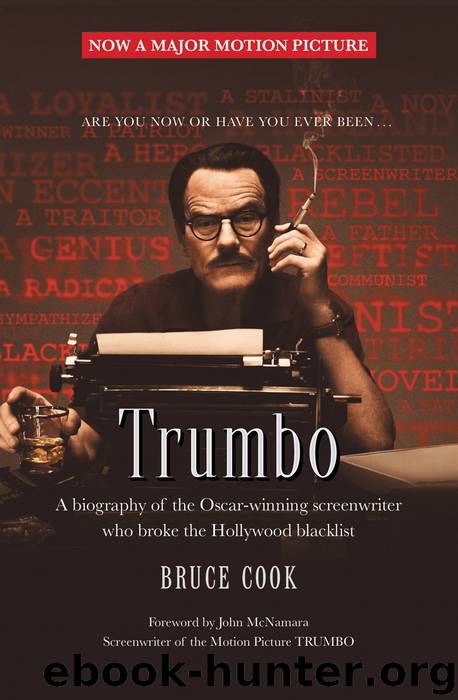TRUMBO by Bruce Cook

Author:Bruce Cook
Language: eng
Format: epub
Tags: Biography & Autobiography / Entertainment & Performing Arts, Art / Film & Video
Publisher: Grand Central Publishing
Published: 2015-09-07T16:00:00+00:00
The face of the Party had hardened and never again would the innocent and the uncommitted feel comfortable before it. The recollections of that period for repentant Hollywood Communists are of repetitive plunges into a cesspool. They have forgotten the abstractions of doctrine; they remember only Alvah Bessie “morosely clawing” at Lester Cole, Dalton Trumbo “ripping at” Cole, and Cole “tearing at” Lawson. They were walking toward a common grave, hating one another.
Since there is no indication here, or anywhere else, what Trumbo was saying as he ripped at Lester Cole, his memories of the affair are the only record of his feelings at the time. “I was asked to write an article for the New Masses, as a number of others did, on the issue, attacking the Maltz position,” said Trumbo. “I refused to do it. It was not an act of great courage, but I figured, what the hell. Though I didn’t much like [the Maltz article], some of the criticisms of it were so vicious, and you found in them personal differences, or jealousies, or quarrels being translated into ideological principles, which always happens. And this made it the worst of all the episodes at the time. It wasn’t the worst that he recanted. It was a measure of himself, a sign of belief, a sign of loyalty, and there is a virtue in that. However, I think he was essentially right in his original article and wrong in his recantation. But he will to this day defend his recantation and will not defend his original article.”
Later, when I conveyed what Trumbo had said to Albert Maltz, Maltz looked at me severely and asked, “Did he say that? Did he indicate that he hadn’t had much to say at the time?” That, I said, was correct. “Well,” Maltz said, with a shake of the head that conveyed paragraphs of rebuttal, “I suppose I’ll have to let that stand then.”
These events—the Duclos letter and the consequent deposing of Earl Browder as head of the Communist Party, together with the Maltz affair which followed—all transpired against a background of labor unrest in Hollywood which itself had a profound and far-reaching effect on the situation that led to the blacklist. All during the war, there was a series of jurisdictional disputes and actions between the two major craft union bodies in Hollywood, the International Alliance of Theatrical Stage Employees & Motion Picture Machine Operators (IATSE), on the one hand, and the Conference of Studio Unions (CSU), on the other. Herb Sorrell, the leader of the CSU, though not a Communist himself, had been sympathetic to the Communists and had gotten to his position of power there in Hollywood at least partly through their help. On the other side was Roy Brewer, an AFL leader who had had a job with the War Labor Board before coming out to the West Coast to take charge of the union during the war. A strike finally resulted. It was called by Sorrell on March 12, 1945.
Download
This site does not store any files on its server. We only index and link to content provided by other sites. Please contact the content providers to delete copyright contents if any and email us, we'll remove relevant links or contents immediately.
| Actors & Entertainers | Artists, Architects & Photographers |
| Authors | Composers & Musicians |
| Dancers | Movie Directors |
| Television Performers | Theatre |
Cecilia; Or, Memoirs of an Heiress — Volume 2 by Fanny Burney(31951)
Cecilia; Or, Memoirs of an Heiress — Volume 3 by Fanny Burney(31935)
Fanny Burney by Claire Harman(26598)
We're Going to Need More Wine by Gabrielle Union(19040)
Plagued by Fire by Paul Hendrickson(17409)
All the Missing Girls by Megan Miranda(15973)
Cat's cradle by Kurt Vonnegut(15343)
Bombshells: Glamour Girls of a Lifetime by Sullivan Steve(14062)
For the Love of Europe by Rick Steves(13967)
Leonardo da Vinci by Walter Isaacson(13323)
4 3 2 1: A Novel by Paul Auster(12382)
The remains of the day by Kazuo Ishiguro(8985)
Adultolescence by Gabbie Hanna(8925)
Note to Self by Connor Franta(7666)
Diary of a Player by Brad Paisley(7565)
Giovanni's Room by James Baldwin(7334)
What Does This Button Do? by Bruce Dickinson(6198)
Ego Is the Enemy by Ryan Holiday(5424)
Born a Crime by Trevor Noah(5377)
